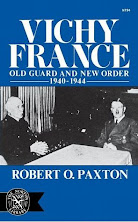During Donald Trump's term as president of the United States, Paxton remained reluctant to label his regime as "fascist." The Times Magazine profile is mostly about Paxton's turn, on and after January 6, 2021, to become a confirmed advocate for labelling what is going on in the United States as a fascist movement.
Historians have been influential, one might say, in the evolving analysis of Trump and MAGA and what it means. Think of Timothy Snyder, historian of Central Europe and author of Bloodlands, about that region's experiences during the Second World War. Snyder has been one of the leading opinion makers, first, on Ukraine and its resistance to Russian conquest, but equally importantly on tyranny and freedom in the United States (and other democracies).
Think of Anne Applebaum, student of the history of the Soviet Union and post-Soviet Russia and its neighbours, whose Autocracy Inc is a current bestseller.
And let me add my friend Ken McGoogan, best know as the chronicler of 19th century Arctic exploration in six successful books, whom the Trump phenomenon has turned into a political sage. His Shadow of Tyranny is hardly about current events at all -- except it totally is at the same time. It's a collection of portraits of individuals who confronted Fascism in the interwar years of the 1920s and 1930s, during the war itself, and in the postwar period, bringing us up to the near present: writers, politicians, reporters, spies, resistance fighters opposing autocratic rule


